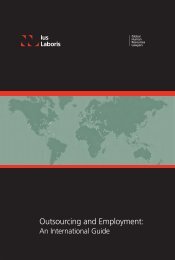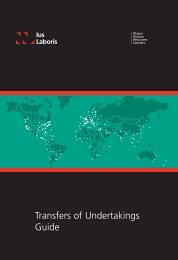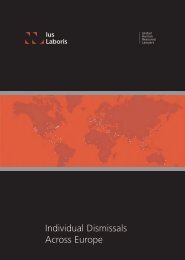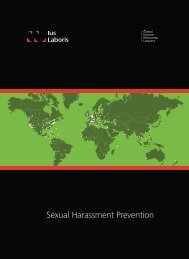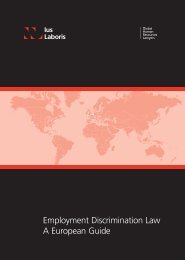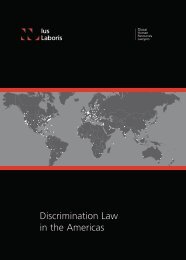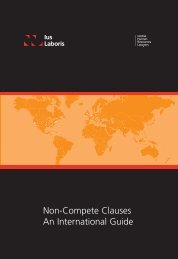Regional Rigidity in Latin America - Ius Laboris
Regional Rigidity in Latin America - Ius Laboris
Regional Rigidity in Latin America - Ius Laboris
You also want an ePaper? Increase the reach of your titles
YUMPU automatically turns print PDFs into web optimized ePapers that Google loves.
Source: Lat<strong>in</strong> Lawyer<br />
Country: United K<strong>in</strong>gdom<br />
Author: Marieke Breijer<br />
Date: January 2012<br />
Page: Web<br />
<strong>Rigidity</strong> <strong>in</strong> personnel contracts extends to the hours the employee is hired for. In another clash<br />
between bus<strong>in</strong>ess cultures, regular shifts are the norm <strong>in</strong> Lat<strong>in</strong> <strong>America</strong> while overtime is strictly<br />
controlled. Enrique Munita, partner at Philippi, Yrarrázaval, Pulido & Brunner <strong>in</strong> Chile, tells of the<br />
complications that arose when a client <strong>in</strong> the fast food bus<strong>in</strong>ess realised Chilean law would not<br />
allow it to impose flexible work<strong>in</strong>g shifts on its employees. Partner Enrique Uribe of Chile’s<br />
Uribe, Hübner & Canales Abogados presents the same view: “A very important difference with<br />
US law is that you have to have fixed schedules. I know a mult<strong>in</strong>ational that <strong>in</strong> the US has a<br />
weekly schedule where they can move the worker from one schedule to another to adapt<br />
themselves to a specific week. Here <strong>in</strong> Chile it is more difficult to move the shifts.” When the<br />
authorities f<strong>in</strong>d that rules are be<strong>in</strong>g broken, f<strong>in</strong>es are imposed. Though the penalties are not<br />
very high <strong>in</strong> general, an employer can be f<strong>in</strong>ed “as much as is needed to conv<strong>in</strong>ce the company<br />
to modify the policies,” Munita says.<br />
Before hir<strong>in</strong>g takes place, mult<strong>in</strong>ationals also need to take <strong>in</strong>to account that certa<strong>in</strong> clauses<br />
<strong>in</strong>corporated <strong>in</strong> contracts might not be legal <strong>in</strong> other jurisdictions, says Juliana Giraldo, an<br />
associate at Colombia’s Brigard & Urrutia Abogados. Though fairly standard <strong>in</strong> today’s bus<strong>in</strong>ess<br />
environment, she says that non-compete, non-solicitation and confidentiality clauses are not<br />
enforceable <strong>in</strong> the country because they <strong>in</strong>terfere with <strong>in</strong>dividual labour rights, which make it<br />
easier for employees to leave a job without cost to themselves. If an employee is fired by a<br />
company, however, he or she is most likely entitled to a severance fee, which <strong>in</strong>cludes<br />
proportional parts of any outstand<strong>in</strong>g bonuses, and other costs. And even then, it cannot be<br />
guaranteed that the employee will not try to seek a larger payout, or ask to be reemployed<br />
through the courts.<br />
Further complications can arise when employers want to move employees between countries,<br />
which is a run-of- the-mill practice with<strong>in</strong> the Central <strong>America</strong>n countries, for example. “[Costa<br />
Rica] is a small market, and it is common for employees and expats to travel to other countries,<br />
but the labour laws are all different, and that poses a challenge for companies’ <strong>in</strong>ternal policies,”<br />
says BDS Asesores partner Francisco Salas. “The question is which legislation to look at when<br />
term<strong>in</strong>at<strong>in</strong>g the employee,” says Durante. “In Costa Rica we do not have legislation to regulate<br />
employees that work <strong>in</strong> multiple countries,” he says, add<strong>in</strong>g that there are no coord<strong>in</strong>ated legal<br />
systems for matters such as pensions and benefits, or for dismissals. When a company wants<br />
to term<strong>in</strong>ate contracts, they usually do not have <strong>in</strong>ternal policies <strong>in</strong> place to deal with the matter.<br />
“When people f<strong>in</strong>d themselves term<strong>in</strong>ated with the worst legislation of all, they go to the courts,<br />
but the judges do not have a clear view on it either,” Durante says.<br />
BDS Asesores is a member of global labour law network <strong>Ius</strong> <strong>Laboris</strong>, which facilitates the<br />
discussion of such differences <strong>in</strong> labour legislation. The network <strong>in</strong>cludes other firms mentioned<br />
<strong>in</strong> this article, <strong>in</strong>clud<strong>in</strong>g Funes de Rioja, Veirano Advogado, Philippi Yrarrázaval, Brigard &<br />
Urrutia and Estudio Olaechea. At the time of writ<strong>in</strong>g the Mexican member was Basham, R<strong>in</strong>ge y<br />
Correa SC, although s<strong>in</strong>ce then Oscar de la Vega has left with his labour team to found a new<br />
firm so the membership may change.<br />
To the courts<br />
Compared to the US, litigation related to dismissal is a regular occurrence <strong>in</strong> Lat<strong>in</strong> <strong>America</strong>. “It is<br />
a shock to mult<strong>in</strong>ationals when their employee challenges the term<strong>in</strong>ation process, they th<strong>in</strong>k<br />
they can term<strong>in</strong>ate them at will,” says de la Vega. He adds that, <strong>in</strong> Mexico, an employee is<br />
entitled to all unpaid salary – without a cap – while the case is be<strong>in</strong>g heard, result<strong>in</strong>g <strong>in</strong> liabilities



